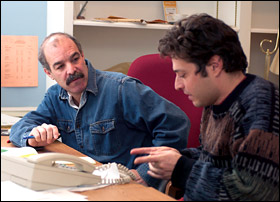
|
 |
Research > Centers
> Marine Policy Center
Marine Policy Center
 |
 |
| Marine Policy
Center Director Andrew Solow (left) confers with Amit
Huppert, a postdoctoral research fellow, on a paper they
authored on the use of corals in reconstructing past climate
history. (Photo by Tom Kleindinst) |
The Marine Policy Center (MPC) conducts social scientific research
that integrates economics, policy analysis, and law with the
Institution’s basic research in ocean sciences. Areas of recent
research include off shore wind energy, fisheries and aquaculture,
and the management of coastal and marine resources.
Offshore wind energy was an important new focus in 2003. Wind
energy is the fastest-growing sector of the electric power industry
domestically and worldwide, and the United States accounts for
about 15 percent of the world’s wind energy market. In recent
years, about two dozen proposals have been advanced to build
wind farms at locations in the U.S. coastal ocean where winds
are consistently strong, demand for power is concentrated nearby,
and connections to the electric power grid are readily available.
In October, MPC researchers convened a workshop of international specialists to examine issues
raised by such proposals, which entail a new use
of a public resource that must be balanced against
other, potentially conflicting, uses. Research Specialists Porter Hoagland and
Hauke Kite-Powell and Research Assistant Mary
Schumacher organized the event, with support from
the Coastal Ocean Institute.
The workshop focused on the development of a U.S. management approach and policy
framework for siting wind energy facilities in the coastal ocean.
Off shore wind energy proposals are currently addressed through
a rudimentary system based on the Rivers and Harbors Act of
1899, which was not written with this particular ocean use in
mind. The system is incapable of handling multiple claims to
the same area, nor can it provide a rational framework for minimizing
environmental impacts and conflicts between users.
MPC researchers are now drafting a white paper that will summarize
the discussions and results of the workshop. In the next phase
of its research, the team will identify features of an optimal
system of legal access to offshore areas; describe the tradeoffs
that must be confronted by the agencies managing the access
system; and propose areas where further policy analysis is most
likely to contribute to informed public decisions about the
location of wind farms.
In other ongoing projects, MPC researchers are
assessing the economic impacts of the introduction
and spread of non-native aquatic nuisance species, and evaluating a range of management alternatives. Another study is examining the potential for nutrient
removal from coastal waters through the cultivation
and harvesting of filter-feeding shellfish, such as oysters and clams.
Promotions
• Andy Beet, Information Systems Associate II
—Andrew Solow (asolow@whoi.edu)
Marine Policy Center Director
|
|
